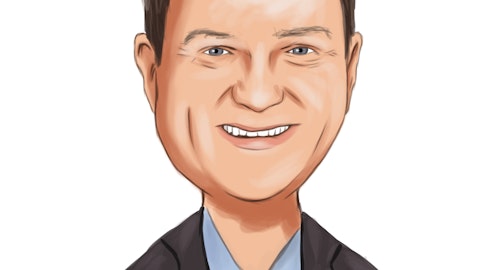Carey Smith: Good morning, Louie.
Louie Dipalma: Carey, your Middle East business reported 30%-plus revenue growth for the third consecutive quarter. You mentioned your customers in the Middle East have added scope to existing projects. Is there visibility for Middle East revenue to continue to expand from here?
Carey Smith: Thanks, Louie. So Middle East has been very strong. We’re fortunate again that we’re on 505 of the Saudi Giga projects. The ones that I would say are particularly important to us are new on the line, NEOM’s THE LINE, NEOM OXAGON, as well as Qiddiya. We’re also outside of Saudi Arabia, though, seeing growth. Saudi Arabia has its vision 2030, but they’re similar visions that have been established in the UAE, both in Dubai and Abu Dhabi for projects of the ’50 and Vision 2040. And then Qatar also has a vision 2023. So, we expect to be able to continue to grow in the Middle East. Obviously, 30% plus is very strong. We’d love to be able to keep it at that rate. But I do think we see a very long-term trajectory out through 2050 of continued Middle East expansion.
Louie Dipalma: Great. And also recent data shows that the intel community budget had a big increase in fiscal ’23 and is in line for another large jump in fiscal ’24, assuming the budget passes. You referenced several cyber intel contract wins. Can you discuss how your acquisitions have enhanced your solutions portfolio? And have you been able to take market share from competitors and take contracts away from competitors because you’re definitely growing faster than competitors in this intel market? Thanks.
Carey Smith: Yes. Thanks, Louie. So I’ll take the second part first. We don’t generally target market share takeaway. We are really after the new and emerging customer challenges. So, if you look at our capabilities in cybersecurity, we play at the very top end of the pyramid. Again, 75% roughly offensive, 25% is defensive in our portfolio. The companies we bought have all enhanced our cyber capabilities recently. I mean if I start with Sealing Technologies, Sealing Technologies has fly-away kits where they can basically deploy these kits to be able to enable defensive cyber operations security on systems and networks for customers. They support the intel community and the Department of Defense. But as I mentioned on the call, we also see potential expansion there to our commercial clients as well.
IPKeys likewise, has provided capabilities. They do cyber, compliance and monitoring specifically for energy companies and water companies. For the energy companies, that’s compliance with the NERC and FERC standards and making sure that companies have NIST compliance. All of these are very important as we look forward. Cyber will be an area that we continue to make acquisitions in. It’s one where I feel that we’ve bought discriminating companies. It’s enabled us to win critical jobs like the $1.2 billion GSA job we highlighted last quarter.
Louie Dipalma: Excellent. Thanks, Carey. That’s it from me.
Carey Smith: Thank you, Louie.
Operator: Our next question comes from Josh Sullivan with The Benchmark Company. Your line is open.
Josh Sullivan: Hey, good morning. Congratulations on the good quarter here.
Carey Smith: Thank you, Josh.
Matt Ofilos: Thanks, Josh.
Josh Sullivan: Just following up on that, with the acquisition of Sealing, the $110 million you’re expecting in 2024, how large is your overall cyber exposure at this point? And should we expect that to have above corporate average margins?
Carey Smith: Yeah. So, cyber represents about 13% of our portfolio, and yes, it does have above average margins.
Josh Sullivan: And with Sealing, do you expect that to be higher next year, that 13%?
Carey Smith: The 13% as of today, so Sealing Tech adds an additional $110 million to the portfolio.
Matt Ofilos: I would say, Josh, that the cyber business is growing double digits. So, we suspect it will continue to increase as a percentage of the company.
Josh Sullivan: Got it. And then just on the $250 million radiation device win, how much of that is hardware versus software services? And then do you see that as a market which could find some international interest as well?
Carey Smith: Yeah. So the majority of the radiation device win is systems integration. So we’re actually putting the system together that performs the testing at areas like airports and ports, for example, and also it could be used on the border as well. We do see market expansion there. We have a pipeline both in the United States, but that could potentially expand international.
Josh Sullivan: Okay. Thank you for the time.
Carey Smith: Thanks, Josh.
Operator: [Operator Instructions] Our next question comes from Andrew Wittman with Baird. Your line is open. Our next question comes from Andrew Wittman with Baird. Your line is open. [Operator Instructions] The next question comes from Noah Poponak with GS. Your line is open.
Noah Poponak: Hey, good morning, everyone.
Carey Smith: Good morning, Noah.
Matt Ofilos: Good morning, Noah.
Noah Poponak: Carey, you’ve discussed here the possibility of a shutdown versus short-term extensions. It seems like the longer they are short-term extensions though, the less likely there is actual full year bills, and we live in this unique situation where the debt limit deal says there’s this 1% cut kind of across the board on the discretionary side, if there are no bills. How are you — just given you have a really good perspective on these macro things, what do you think is the likelihood of that? How are you managing Parsons relative to that possibility?



